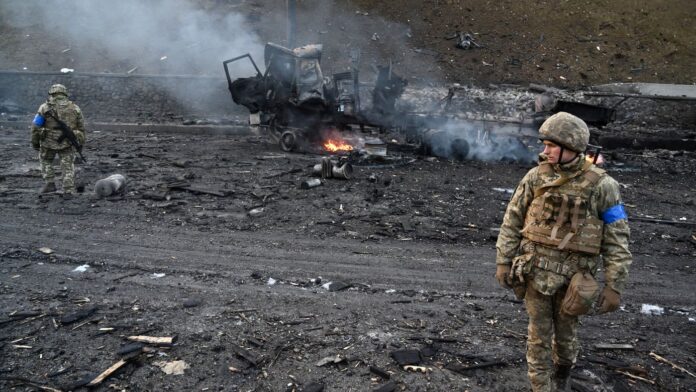As of now, unfortunately, we cannot see any sign of an early end to the unfolding tragedy that started on 24th February 2022 when the Russian invasion began. By now according to estimates made by the Pentagon each side might have sustained about 100,000 casualties, including the dead and the wounded. Let us look at some recent developments before trying to figure out what is in store in the winter season that has already set in.
By Amb K P Fabian
The Destruction of Power Plants and Grids in Ukraine by Russia
On 8th October 2022 the bridge connecting Russia and the Crimea across the Kerch Strait was bombed causing considerable damage. The bridge, completed in 2018, four years after the annexation of the Crimea, has been used to send troops and military supplies to the Crimea. A 56-wagon train carrying fuel caught fire, and the traffic could be restored only after a few days. The attack coincided with Putin’s birthday. Though Kiev officially did not claim responsibility, it did come out with a special stamp marking the occasion.
It may be recalled that way back in April 2022 former President Medvedev, currently Deputy Chairman of the Russian Security Council, presided by President Putin, had warned Ukraine of severe retaliation should it attack the same bridge.
A commission appointed by President Putin concluded that Ukraine was responsible for the attack. On 11th October 2022, Russia carried out the ‘biggest air attack’ on Ukraine targeting infrastructure, mainly civilian, related to electricity and water.
On 19th November 2022 Ukraine announced that over 10 million were without electricity, and Ukrainians who can afford it have been advised to leave the country. A resident from Mukachevo, near the border with Hungary, has told the author that he gets electricity for only half an hour a day. The situation is truly grim. The argument that the more pain Russia imposes, stronger the resistance and defiance of the Ukrainians, is being put to test this winter.
Does Washington Want Ukraine to Negotiate with Russia?
There are clear signals that Washington is nearing the conclusion that Kiev needs to change its adamantine refusal to talk to Moscow.
The Washington Post (6th November 2022) reported, “The Biden administration is privately encouraging Ukraine’s leaders to signal an openness to negotiate with Russia and drop their public refusal to engage in peace talks unless President Vladimir Putin is removed from power, according to people familiar with the discussions.” It was further clarified that Washington was worried that unless Ukraine shows willingness, a certain ‘Ukraine fatigue’ might set in, not in United States as such but in the rest of the world. Therefore, it was in Ukraine’s interest to appear to be willing and able to negotiate.
Earlier, on 4th October 2022, after Russia formally claimed on 30th September that it had annexed four regions of Ukraine (Luhansk, Donetsk, Zaporizhzhia and Kherson), President Zelensky ‘decreed’ that there would be no talks with Russia so long as Putin remains President.
On 16th November 2022, General Mark Milley, Chairman of Joint Chiefs of Staff, the highest-ranking military officer, publicly stated that after the Ukrainians have recaptured Kherson it makes sense for Ukraine to negotiate with Russia. At the same time, the U.S. has reiterated publicly that it is for Ukraine to decide.
The Missile that Landed in Poland
On 15th November 2022, a missile struck Przewodów, a Polish village close to the border with Ukraine, and two villagers were killed. The missile was Russian made. The Russian Ambassador was summoned to the Polish Foreign Office that demanded ‘explanations’. Moscow denied sending any missile to Poland, and the BBC reported that the Russian denial should not be taken seriously.
The incident occurred when President Biden was in Bali attending the G-20 summit. The NATO concluded after investigations that it was not a missile sent by Russia and that it might be a Ukrainian missile deployed against incoming Russian missiles that strayed into Poland. President Zelensky insisted that it was not a Ukrainian missile, but he has not been taken seriously by the NATO.
Before the NATO came to that conclusion there was much speculation about how NATO would react to attack on a member-state: Will it invoke the dreaded Article 5 and start a war with Russia? Fortunately, there was no need to invoke that dreaded article.
Biden-Xi Jinping Meet in Bali
President Biden had asked for the meeting and the two met in Bali on the sidelines of the G-20 summit. Biden tried to persuade his interlocutor to put pressure on Putin to end the war. The Western media have highlighted that Biden and Xi Jinping “Agree Nuclear Weapons Use in Ukraine Totally Unacceptable”, as News Week’s John Feng put it.
The White House readout says, “President Biden and President Xi reiterated their agreement that a nuclear war should never be fought and can never be won and underscored their opposition to the use or threat of use of nuclear weapons in Ukraine.”
The Chinese Foreign Ministry statement omits any mention of ‘nuclear war’. We may speculate that the matter was discussed, and that China did not want to hurt Russia’s sensitivities by including it in their account.
The Damage to Nord Stream 1 and 2
Sweden has come out with the result of its investigations into the damage caused to the two pipelines by underwater explosions on 26th September 2022. The finding is that there was ‘intentional’ sabotage. Earlier President Putin had termed it as “an act of unprecedented international terrorism”. Moscow has accused the United Kingdom’s Royal Navy of involvement.
Sweden has not named anyone. Some Western sources have claimed that Russia itself might have done it as a warning about the vulnerability of pipelines from Norway that has replaced Russia as supplier to EU. The argument looks rather far-fetched. If Putin wanted to do it as a warning about what can be done to pipelines from Norway, why should he damage the pipelines of Gazprom?
EU/G7’s Plan to Cap Price of Russian Oil
The EU will stop importing sea-borne oil from Russia from 5th December 2022. The EU has instructed its insurance and shipping companies to cease all business involving oil from Russia. The G-7 after long deliberations has agreed to impose a cap on price of oil from Russia.
We do not know whether the price cap will have the intended impact. It might even boomerang by raising the price. In this context, we might note President Biden’s failure to persuade Saudi Arabia to increase production of oil to bring down the price. Russia has already started to divert to Asia the shipments earlier going to Europe.
The Danger to Nuclear Plant at Zaporizhzhia
The biggest nuclear plant in Europe captured by Russia in March 2022 has been shelled from to time, despite the danger of massive deadly radiation. Despite IAEA Director General Rafael Mariano Grossi’s repeated warnings the shelling has not stopped. Ukraine has claimed that Russia has been shelling even as it is difficult to figure out why Russia should do it. It appears that Zelensky wants to play with fire and Washington cannot stop him.
India’s Policy
India has consistently followed a policy taking care of its interests and seeking an early cease-fire to be followed by negotiations. Prime Minister Modi’s assertion that ours is not an era of war has found much resonance in the West. India correctly abstained on the motion asking Russia to pay for reconstruction in Ukraine at the U.N. General Assembly. Russia has emerged as the biggest source of import of oil, beating Saudi Arabia and Iraq. Washington seems to have realized that its efforts to persuade India to cut down imports from Russia were in vain.
When will there be a Cease-Fire?
Volodymyr Havrylov, Deputy Minister of Defence of Ukraine, has expressed his hope of Ukraine’s recapturing all territory including the Crimea by the end of spring next year, bringing the war to a close. We do not know to what extent his stated position represents President Zelensky’s own approach.
There is an important point about the war often missed out by the Western media and pundits. There are two wars, one between Russia and Ukraine, and another between the NATO and Russia. For a cease-fire, talks between Moscow and Kiev are necessary to end the first war. But the war cannot be ended unless there are talks between Moscow and Washington.
It is possible to think of a scenario of all the three parties seriously searching for a cease-fire after or during the winter. Ukraine is unlikely to get electricity from EU. There is a limit beyond which the Ukrainians in Ukraine can subsist without regular supply of electricity and water. President Putin might have started to realize that his plans to topple Zelensky and sign a treaty with his replacement have gone awry. President Biden, facing a Republican controlled House of Representatives, might be compelled to seek an end to the war as the political costof prolonging it goes up.
Simultaneously, EU might realize that its plans to be free of dependence on Russia for energy needs more time. In any such scenario, Putin will insist on lifting sanctions, a heavy price the West will be reluctant to pay.
As of now, there is no reason to believe that Ukraine’s military success in recapturing Kherson will be repeated and again till the Crimea is recaptured.
In short, the war might end when all the three parties are exhausted. Sadly, hundreds or even thousands more will be killed and the baneful impact on the global economy will continue.
This article first appeared in www.vifindia.org and it belongs to them.








